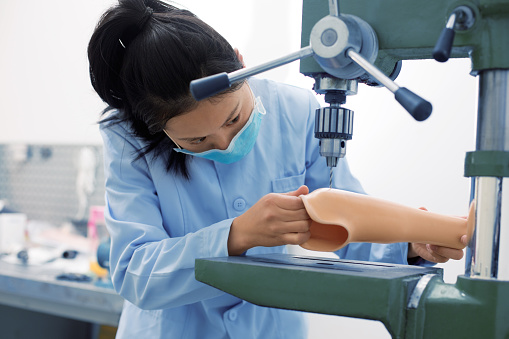Edition: December 15th, 2021
Curated by the Knowledge Team of ICS Career GPS

- Excerpts from article by Smriti Arora, published on biospectrumindia.com
Biomedical engineering is an amalgamation of medicine and engineering fields. It involves researching and developing solutions to biological and medical problems. Biomedical engineers use their curiosity, research aptitude and engineering knowledge to design much needed medical equipment.
A biomedical engineer makes devices of medical importance that can be life-saving such as surgical robots, biosensors, cost-effective respirators, etc. While the range of products that a biomedical engineer can offer to society is large so is the scope of the field.
The medical device industry in India is ever-growing and medical technology is estimated to reach $50 billion by 2025.
The range of careers that a biomedical engineer can choose from are:
1. Biomedical materials engineering
These engineers need to thoroughly understand the materials apt for medical devices, keeping in mind their biocompatibility and biodegradability. Such an engineer is expected to be skilled in materials science, modelling and simulation of material design.
2. Algorithm design engineering
In the biomedical field, these experts focus on integrating data from various platforms such as micro-fluidic devices, imaging, genomics, to be used in research, diagnostics and therapeutics.
3. Manufacture of medical devices
Like other production engineers, biomedical engineers can get into the production and upscaling of medical devices, leading to jobs like manufacturing engineer (biomedical devices).
4. Design engineering
There are various aesthetic aspects that have to be taken into consideration before a biomedical device can be considered useful. A combination of design and engineering (biomedical engineering) is appropriate to develop user-friendly devices.
5. Biomedical and clinical research
Biomedical engineers can find an easy way into research in sub-fields like tissue engineering and clinical research, which involve the testing of biomedical devices. They can help invent innovative devices as well as modern methods of testing these devices.
6. Data analysis
Like any other data analyst job, programming skills are a must for this profession. Students willing to be biomedical data analysts should have the ability to script using Python, R or any programming language. They should also be able to use data sources such a Kaggle to generate meaningful information.
7. Biomedical signal analysis
This is a profession requiring higher-level programming skills and the ability to use different sets of data. Biomedical signals are collected from the body at various levels — organ, cell or molecule. These signals can be used to detect different diseases or conditions. These professionals need to have knowledge of MATLAB, labview, developing tools for analysis of EEG, ECG and other medical devices.
8. Biomedical device engineering
A biomedical device engineer can make a range of devices such as diagnostics, biosensors and prosthetics.
9. Sales and marketing of biomedical products
Knowledge of medicine and the engineering of medical devices can also lead to a successful career in biomedical sales and marketing.
10. Preventive and protective maintenance
This is a routine job offered at hospitals and diagnostic laboratories to prevent the breakdown and failure of medical equipment and systems . It is worthwhile for a start to understand the running and operation of biomedical devices.
11. Biomechanics and rehabilitation engineering
This is a field that deals with the effective use of biomedical devices simulating patient treatment and modelling prosthetics. Knowledge of biomechanics can lead one into this lucrative field.
12. Healthcare consulting
The rigour of the curriculum of biomedical engineering allows one to venture into ‘healthcare consulting’. Interviewing people who want to take up their journeys in various biomedical specialisations or have been into it and require advice, creating a knack for business terms, keeping abreast with the latest advancements in the area are some of the skills needed for consulting.
13. Teaching
Teaching students with an interest in the field of biomedical engineering would also be a lucrative option available to a biomedical engineer.
14. Working as a physician
Occasionally, biomedical engineers get intrigued by the profession of medicine to become doctors themselves. This usually happens as they work in close proximity with physicians. Of course, they will have to go through a medical school to be able to make this switch.
….
Career Trends: 5 Rock-Solid Leadership Strategies for Millennial Leaders
(Disclaimer: The opinions expressed in the article mentioned above are those of the author(s). They do not purport to reflect the opinions or views of ICS Career GPS or its staff.)




One Reply to “Career Trends: Biomedical Engineering — A booming career field.”